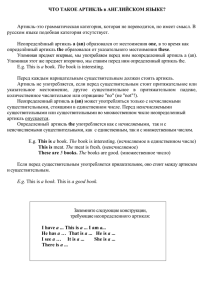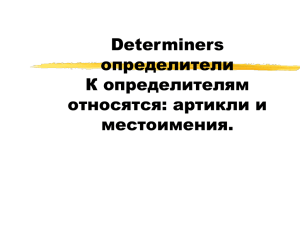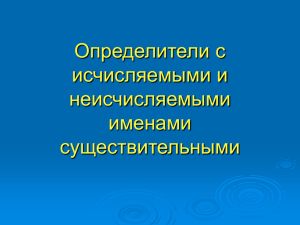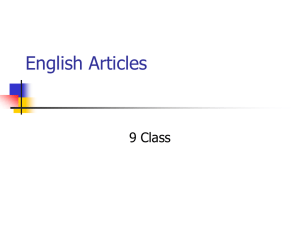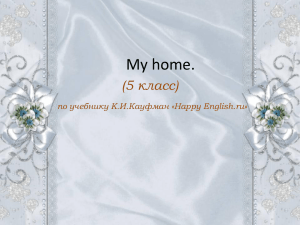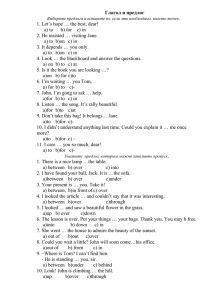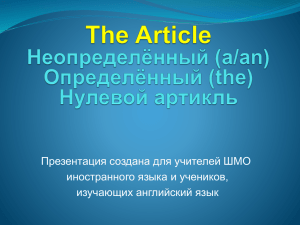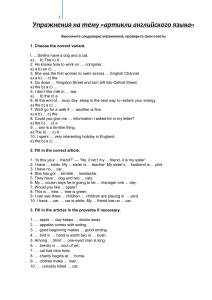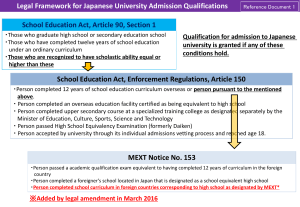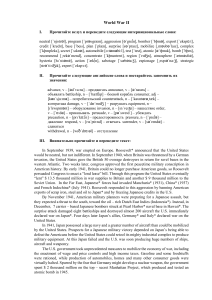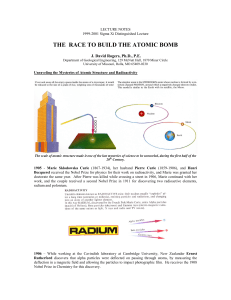Английский язык 7 класс - Центр дополнительного образования
реклама
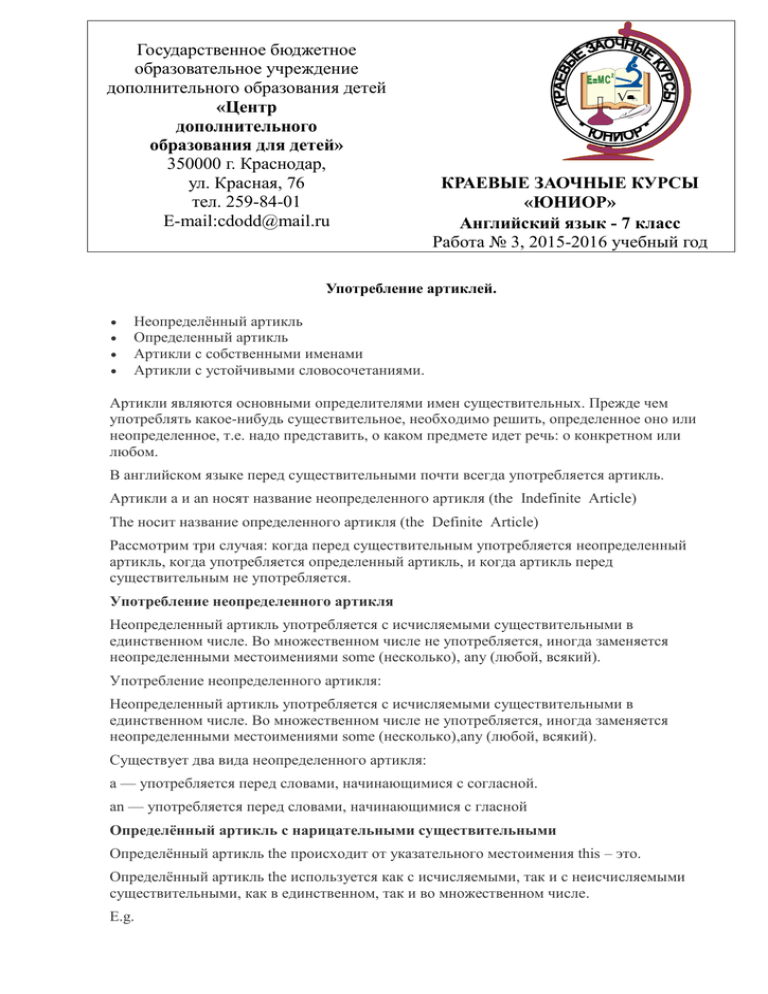
Государственное бюджетное образовательное учреждение дополнительного образования детей «Центр дополнительного образования для детей» 350000 г. Краснодар, ул. Красная, 76 тел. 259-84-01 E-mail:[email protected] КРАЕВЫЕ ЗАОЧНЫЕ КУРСЫ «ЮНИОР» Английский язык - 7 класс Работа № 3, 2015-2016 учебный год Употребление артиклей. Неопределённый артикль Определенный артикль Артикли с собственными именами Артикли с устойчивыми словосочетаниями. Артикли являются основными определителями имен существительных. Прежде чем употреблять какое-нибудь существительное, необходимо решить, определенное оно или неопределенное, т.е. надо представить, о каком предмете идет речь: о конкретном или любом. В английском языке перед существительными почти всегда употребляется артикль. Артикли a и an носят название неопределенного артикля (the Indefinite Article) The носит название определенного артикля (the Definite Article) Рассмотрим три случая: когда перед существительным употребляется неопределенный артикль, когда употребляется определенный артикль, и когда артикль перед существительным не употребляется. Употребление неопределенного артикля Неопределенный артикль употребляется с исчисляемыми существительными в единственном числе. Во множественном числе не употребляется, иногда заменяется неопределенными местоимениями some (несколько), any (любой, всякий). Употребление неопределенного артикля: Неопределенный артикль употребляется с исчисляемыми существительными в единственном числе. Во множественном числе не употребляется, иногда заменяется неопределенными местоимениями some (несколько),any (любой, всякий). Существует два вида неопределенного артикля: a — употребляется перед словами, начинающимися с согласной. an — употребляется перед словами, начинающимися с гласной Определённый артикль с нарицательными существительными Определённый артикль the происходит от указательного местоимения this – это. Определённый артикль the используется как с исчисляемыми, так и с неисчисляемыми существительными, как в единственном, так и во множественном числе. E.g. The book is interesting. (исчисляемое в единственном числе) The books are good. (исчисляемое во множественном числе) The meat is fresh. (неисчисляемое существительное) Артикль The с нарицательными существительными обычно употребляется: Когда ситуация делает предмет определённым. E.g. Give me the book. Если есть уточняющее определение. E.g. This is the house that Jack build. Если есть самостоятельные прилагательные, выступающие в роли существительных. E.g. The rich and the poor live in different districts. Если перед существительным стоит порядковое числительное. С названиями музыкальных инструментов. E.g. I play the guitar. Со следующими существительными: cathedral, cinema, office, theatre, radio, bank, post office, doctor, dentist, opera E.g. I like to go to the opera. Ни один артикль не используется: Если перед существительным стоит притяжательное местоимение или указательное местоимение. E.g. Give me my pen. This is my book. Если существительное стоит перед количественным числительным. E.g. Open text ten. Open page five. Артикль не употребляется перед существительными, обозначающими названия времен года, месяцев, дней и приемов пищи: Summer is my favourite season. Перед существительными, обозначающими средства передвижения (с предлогом by): Bybicycle – на велосипеде Определенный артикль с именами собственными. Имена собственные употребляются, как правило, без артиклей: Ann, Moscow, England, Africa, Christmas. E.g. London-is the capital of Great Britain. Это могут быть: Имена и фамилии людей: E.g. I spoke about Tommy. Без артиклей употребляются слова, обозначающие ранг, титул, семейные отношения, общественное положение: Aunt Polly, Captain Brown, Mrs White. Нет артикля если перед именем собственным стоят слова :young, old, good, poor, little, honest, kind, dear. E.g. Little John sat down on the bottom step and nodded. C названиями городов, континентов, стран, провинций, областей: Europe, America, Great Britain, Moscow, London. Исключение: the Crimea Крым, the Caucasus Кавказ, the Tyrol Тироль, the Hague Гаага, the Russian Federation — Российская Федерация; the Ukraine — Украина; the Brazil — Бразилия; the USA — США; the United Kingdom — Соединённое Королевство. E.g. I asked him how he liked Paris. С названиями отдельных островов, горных вершин, заливов: Cuba, Elbrus, HudsonBay. E.g. Kilimanjaro is a snow covered mountain 19 710 feet high. Сназваниямиулиц, мостов, парков, площадей: Gorki Street, Oxford Street, Central Park. E.g. He began to walk very rapidly up towards Trafalgar Square. Сназваниямиуниверситетов, аэропортов, железнодорожныхстанций: Moscow State University, London Airport, Victoria Station. S E.g. he had seen him with Bayliss in Padington Street. С названиями планет, звезд, созвездий: Venus, Cancer. Mars Определенный артикль обычно употребляется: Сназваниямиокеанов, морей, рек, озер, проливов: the Pacific Ocean, the Atlantic Ocean, the Baltic Sea, the English Channel, the Volga, the Thames, the Baikal. E.g. The liner crossed the Atlantic Ocean in seven days. С названиями горных цепей, групп островов, пустынь: the Urals, the Pamirs, the Philippines, the British Isles, the Sahara. E.g. With my father I had seen the Rockies and the Andes. С названиями театров, музеев, гостиниц и памятников: the Bolshoi Theatre, the Hermitage, the Metropole. E.g. I thought I’d take a look at the British Museum. С названиями кораблей и названиями большинства английских и американских газет и журналов: the Titanic, the Morning Star, the Times. E.g. So you’re sailing on the Atlantic, too! С названиями государственных учреждений и организаций: E.g. He sends bills to the Parliament, I suppose. С названиями четырех стран света: the North, the South, the East, the West. E.g. The sun has moved to the West. С названиями уникальных космических объектов: the Earth, the moon, the sky, the sun С названиями войн, общественно-политических движений: the Crimean War, the First World War, the Second World War, но: World War I, World War One – войны с количественным числительным Использование артиклей с “застывшими словосочетаниями” Существует огромное количество так называемых “застывших словосочетаний”, в которых артикль употребляется или отсутствует традиционно. Эти словосочетания необходимо заучивать наизусть. Запомните следующие конструкции и предложения: There is a ... I have a... Where is the ...? This is а... The (book ) is on the (table) . Но: The (book) is on a little (table). In front Запомните следующие застывшие словосочетания: in the middle in the corner to the right to the left In the morning after work In the afternoon from work In the evening after school at from school night А также: To go to bed To go To go to work To come Tо go to school to leave At home home home for work for school half past five at a quarter past five Запомните следующие застывшие словосочетания без артикля after breakfast, after after dinner, after before lunch, after tea, supper; breakfast, before lunch, before tea, before dinner, before supper; for breakfast, for lunch, for tea, For dinner, for at breakfast, at at dinner, at supper; lunch, at tea, supper. Задания I. Прочитайте текст и определите, верны ли утверждения. Living a Long Life It is often said that Japanese people, on average, live much longer than Europeans. To a large extend this must be due to the food most Japanese people eat since from the point of view of the life-style, life in modern Japan is no less stressful than ours in the west. The Japanese live on a diet largely made up of fish and rice. At lunch-time a typical Japanese family will consume at least twice as many vegetables as we do in Europe. In comparison with Europeans, the Japanese eat far less meat and fewer potatoes; at the same time, they eat seven times more fresh fish than we do which make their diet much healthier by far. It would be fair to say that, in general, the Japanese consume far less sugar than Europeans, though the modern Japanese — frequent visitors to Europe on business or for pleasure — are discovering the pleasures and dangers of western-style eating habits. true false 1) The Japanese live as long as people in western countries. 2) From the point of view of life-style, life in modern Japan is less stressful than in Europe. 3) The Japanese eat much more vegetables than Europeans. 4) When in Europe on business, the Japanese try to eat only their national food. 5) They consume more sugar than we do. II. Выберите правильный ответ из предложенных. 1. Her parents want … to behave well at school. a) him b) her c) she 2. My neighbour is a lecturer; she ... French at the university. a) studies b) learns c) teaches 3. I eat too much chocolate. I really … stop. a) should b) have to c) must 4. The man … answered the phone was really rude. a) who b) which c) when 5. The CD … you gave me for my birthday is my favourite now. a) who b) which c) why Внесите результат в таблицу. 1. 2. 3. 4. 5. III. Постройте предложения из данных слов. Поставьте глаголы в правильную форму. 1. Usually, she, afternoon, what, in, does, the , do? 2. Wear, nice, always, Jenny, clothes. 3. Their, spend, how, they, weekend, do? 4. Always, enjoy, Julia, of, her, parties, friends, the Внесите результат в таблицу. 1. 2. 3. 4. IV. Прочитайте текст. В нём неверно употреблено 11 слов. Произношение правильных слов такое же, как и в тексте, а вот их написание отличается. Найдите их, используя список нужных слов, и внесите в таблицу по порядку правильные слова. son some meat way threw sent week buy piece road two Last weak, I cent my sun John to the shops to bye sum food. He got a peace of meet and too pears. On the weigh home, the bag broke. The food fell onto the rode and got dirty. In the end, John through the food in the bin. Внесите результат в таблицу. 1. 2. 3. 4. 5. 6. 7. 8. 9. 10. 11. V. Поставьте артикли с именами собственными, если это необходимо. 1. … Cairo is … capital of … Egypt. 2. It was so picturesque in … Crimea … last summer. 3. I had … my holiday in … northern Italy … last year but I’m going to cross … Atlantic ocean and visit … USA … next year. 4. … Moon moves round … Earth. 5. … Great Patriotic war started in 1941. 6. … Volga is … longest river in … Russia. 7. … Ukraine and … Turkey are separated by … Blacksea. 8. My friend usually goes to … Alps in … spring by … plane. 9. … Christmas and … Easter are my favourite holidays. 10. It takes about … hour to get from … Domodedovo airport to … Lenin street. 11. What’s … weather like today in … Australia? 12. … Colorado river flows through … Grand Canyon. 13. My English friend took me to see … National gallery, … Houses of … Parliament and … Tower bridge. 14. … Statue of … Liberty was … present from … French people. 15. … Galaxy where we live is called … Milky Way. 1 … wrote about a boy who lived 8with animals 2 …was a teacher of Maths 9 3 …wrote dramas and historical 10 plays 4 5 … wrote about crimes and 11 12 criminals 6 7 13 14 15 VI. Поставьте артикли a/an или the, где необходимо. 1. 2. 3. 4. 5. Yesterday I bought … pair of … shoes. Unfortunately … shoes are too tight. We had … dinner in … restaurant … last night. – What is … name of … restaurant? His office is on … Floor 5. And I live on … tenth floor. Did you enjoy … food at … party … last Friday? We go to … gym twice … week. 1 2 3 4 5 … wrote …was a …wrote … wrote about a teacher of dramas about boy who Maths and crimes and lived with historical criminals Источники: animals plays 1. Ю. Б. Голицынский Грамматика: Сборник упр-й. - Санкт-Петербург: "КАРО", 2001 г. 2. Клементьева Т. Б., Шэннон Д. А. Счастливый английский. Книга 2 для 7-9 кл. общеобразоват. школ. Обнинск: Титул, 2002 г. 3. Кауфман К. И., Кауфман М. Ю. Рабочие тетради №1, №2, №3 к учебному изданию для 7-9 кл. общеобразоват. шк. "Happy English - 2". - Обнинск: Титул, 2001г., 2003 г. 4. http://study-english.info/ 5. www.uchkopilka.ru
